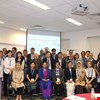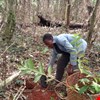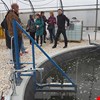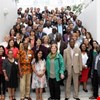


The 6th General meeting of the African Network of Basin Organisations took place from 20 – 22 September 2016 at Lemigo Hotel in Kigali, Rwanda. The meeting took stock of the state of implementation of the resolutions and on the achievements of African network since the holding of the 2015 general meeting.

GWPSA’s technical team participated at the World Water Week in Stockholm from 28th August – 2nd September, 2016. Under the theme, Water for Sustainable Growth, the team participated in a number of sessions contributing to the solutions to the most pressing water-related challenges of today. Key sessions that they participated in included:

The Summer University of Samothraki 2016 took place on 9 - 22 July 2016 on the island of Samothraki in Greece. The summer university consisted of two parallel courses: Course A on “Aquatic and Social Ecology-Theory and Practice” and Course B on “Integrated Water and Coastal Management - Educational and Participatory Approaches”.

The 2016 GWP PANASIA Workshop was organized by GWP SEA and hosted by Singapore PUB in Singapore from July 14 to 15, 2016.

In the framework of strengthening partnership, established since 2007, between GWP-CAf and the University of Dschang, oriented towards providing technical support in the delivery of IWRM related courses at the university, GWP-CAf Staff offered course on Water and Socio-Economic Development, at the School of Wood, Water and Natural Resources, Ebolowa Campus, from 27th -29th of May 2016.
Since 2014, on the invitation of the School of Wood, Water and Natural Resources, GWP-CAf have been facilitating the delivery of the course on Water and Socio-Economic Development (LPEE 233) for 1st year students of the School at the University of Dschang satellite campus in Ebolowa, South Region in Cameroon.
The School of Wood, Water and Natural Resources is part of the Faculty of Agronomy and Agricultural Sciences of the University of Dschang.

The University of Ljubljana hosted the first SANDANUBE workshop on 19-20 April in Ljubljana, Slovenia. Its goal was to define the parameters of a full scale project proposal on sustainable sanitation in Central and Eastern Europe.

Dr Jerome Delli Priscoli is the new Chair of the GWP Technical Committee. However, his history with the network goes back to 1996 at a meeting in Stockholm where GWP was conceived. “The work of GWP is born from a philosophy that is central to my own philosophy, which is a multi-stakeholder, participatory approach,” he says.

The Change Agenda was a big topic at this year’s GWP’s annual Regional Days, which took place in Stockholm 10-13 May. As the network is preparing the 3-year work programme (2017-19), discussions were held on how the network can stay relevant and continue as a frontrunner on global water issues in an ever-changing environment.

The First High Level Ministerial Panel on Responding to Climate and Environmental Challenges in South East Europe (SEE) took place on 1st April 2016, in Podgorica, in the framework of the South East Europe Strategy 2020 and the Regional Cooperation Council (RCC).
The Swaziland Water Youth Forum is an entity under the Ministry of Natural Resources and Energy, housed in the Department of Water Affairs. The forum was established during the SADC Water Week held in Swaziland last year. The forum has an action plan that includes raising awareness of the water sector among young people so as to enhance their participation in national development issues.